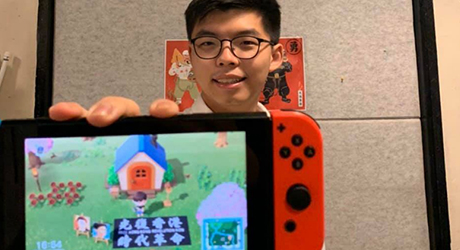Hello and welcome to our today’s post! You can listen to a podcast on the topic of digital activism, and especially through the use of a mainstream video game. Please keep in mind that you are more than welcome to contribute to the conversation and comment your thoughts on the topic.
In toady’s post we will explore whether video games, as a relatively modern ICT tool, can be seen as a communication channel that fosters social interactions for promoting sociopolitical ideologies. More specifically, we will examine whether video games can offer a modern and alternative platform for various activist initiatives that are aiming in social change within various developmental topics, although they are not in the mainstream development sector. We will analyze the case study of a famous Nintendo game called Animal Crossing: The New Horizons, as it was used and perpetuated both by a mainstream politician, Joe Biden, in order to promote his election campaign, but also by many individual or activist groups, such as the case of Joshua Wong, a prominent public figure from the Global South that struggles for a free Hong Kong, and he has used this digital platform as a way to promote his ideology of dissent and resistance. In order to help our discussion, we will use the theoretical framework by DiSalvo that introduces the term ‘Design for Democracy’, in which he makes a valuable distinction between the ‘design for politics’ and ‘political design’. Lastly, we will focus more on the activist potential of a video game, by revisiting the notions of Culture Acupuncture and Detournement, as they both belong in the activist vocabulary.
Listen the Podcast here:
All in all, an online multiplayer video game, as a modern ICT, is a very powerful medium because of its global reach, but also because it offers, through its narration and interactivity, the means for experiencing situations and for participating in socialization in ways that are not limited by time and space, as it is the case with the material interactions. Games have the ability to raise awareness, create knowledge and empathy, and these are the reasons that they can be used as the arena for digital activism in order to promote social change by affecting the discourses about developmental issues in communities from all over the world, including the Global South.
Write us bellow what is your opinion? Can a video game be the arena for conventional and unconventional sociopolitical debates? Is this type of digital activism a valuable tactic in the arsenal of activists? Or maybe, have you ever participated in such online activist initiatives? And finally, can video games be a key factor in the contemporary processes for social change? Well, Tufekci (2017, p.pxx) might have answered that we do not know, and as Zapatistas have said, we walk while asking questions, and indeed, video games seems to offer a modern platform for such inquires.
In fact, if you are a gamer, have you ever thought to start your own campaign on a social subject that you value the most, and inform people within your favorite video game! We invite you to go and “hijack” a game, observe the reactions, and why not, even post in the comments bellow screenshots from your digital activism!
PS: we do not, by any means, advice you to proceed in any illegal action! (Digital) Activism needs proper planning in order to always be on the safe side.
And do not forget to follow us on Instagram and Twitter!!
REFERENCES
Animal Crossing removed from sale in China amid Hong Kong protests. (2020). BBC News. Retrieved 2 October 2021, from https://www.bbc.com/news/technology-52269671.
Animal Crossing: New Horizons for Nintendo Switch – Nintendo Game Details. (n.d.). Nintendo.com. Retrieved 30 September 2021, from https://www.nintendo.com/games/detail/animal-crossing-new-horizons-switch/.
Cermak-Sassenrath, D., (2018). On political activism in digital games. MedieKultur: Journal of media and communication research, 34(64), pp.87-115 https://doi.org/10.7146/mediekultur.v34i64.96924.
DeLaure, M., Fink, M. (2017). Culture jamming. Activism and the Art of Cultural Resistance. NY, USA: New York University Press.
Demirbag-Kaplan, M., and Kaplan-Oz, B., (2017). We beat the cops in GTA: Po(ludic)al activism in the age of video games. Convergence: The International Journal Of Research Into New Media Technologies, 24(6), 623-647. https://doi.org/10.1177/1354856516686481
DiSalvo, C., (2010). Design, Democracy and Agonistic Pluralism, in Durling, D., Bousbaci, R., Chen, L, Gauthier, P., Poldma, T., Roworth-Stokes, S. and Stolterman, E (eds.), Design and Complexity – DRS International Conference 2010, 7-9 July, Montreal, Canada.
Gorman, S., (2008). Obama buys first video game campaign ads. Reuters. Retrieved 29 September 2021, from https://www.reuters.com/article/us-usa-politics-videogames-idUSTRE49EAGL20081017.
Knabb, K., (2006). Situationist International Anthology. Berkeley, CA: Bureau of Public Secrets.
Makena, K., (2020). Biden campaign launches official Animal Crossing: New Horizons yard signs. The Verge. Retrieved 25 September 2021, from https://www.theverge.com/2020/9/1/21409727/biden-harris-animal-crossing-campaign-new-horizons-yard-signs-election.
Nintendo. (2021). Fiscal Year 2021. Retrieved 2 October 2021 from https://www.nintendo.co.jp/ir/pdf/2021/210506_3e.pdf
Number of mobile gamers worldwide by region 2021. Statista. (2021). Retrieved 1 October 2021, from https://www.statista.com/statistics/512112/number-mobile-gamers-world-by-region/.
Schofield, D. (2020). Black Lives Matter meets Animal Crossing: How Protesters Take their Activism into Video Games. the Guardian. Retrieved 22 September 2021, from https://www.theguardian.com/games/2020/aug/07/black-lives-matter-meets-animal-crossing-how-protesters-take-their-activism-into-video-games.
Scott, A., & Street, J., (2000). From Media Politics to e-Protest. Information, Communication & Society, 3(2), 215-240. https://doi.org/10.1080/13691180050123712.
The World’s 50 Greatest Leaders. Fortune. (2015). Retrieved 3 October 2021, from https://fortune.com/worlds-greatest-leaders/2015/.
Tufekci, Z., (2017). Twitter and Tear Gas. The Power and Fragility of Networked Protest. New Haven, USA: Yale, University Press.

